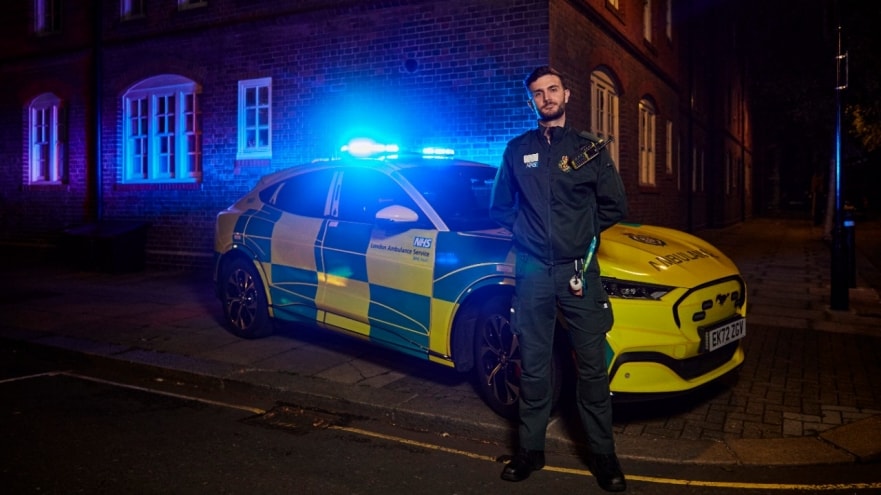When Marek Lowicz-Brady puts on his London Ambulance Service uniform ahead of a 12-hour shift as a paramedic working solo in a fast response car, he has no idea what to expect. Like any big city, London is a place where anything can happen at any moment and he must be prepared to make split second decisions that could save a life.
To get to incidents as quickly as possible 42 Fast Response Unit (FRU) vehicles are used by paramedics at London Ambulance Service, all of which are specially adapted Ford Mustang Mach-E electric vehicle. Marek uses one of those, taking most of the kit found in an ambulance with him as he uses the agility and performance of the Mustang Mach-E to cut through the city traffic.
Aside from the performance credentials, the cars were also chosen for their ability to complete a full shift without needing to be recharged, saving valuable time while also helping to reduce the fleet’s total CO2 emission. But for Marek and his colleagues the most important thing is getting to patients quickly, using their skill, judgement and training to make a difference at the critical time. And for that the Ford Mustang Mach-E is proving to be the perfect partner.
A film following Marek around London as he uses the Ford Mustang Mach-E to reach those in need of help, and an additional film about the SYNC Integration Module have been produced by Ford.
SYNC Integration Module
Ford engineers spent time visiting blue light services to find out what staff really wanted from a vehicle. One key complaint was the amount of additional equipment that was needed on the front windscreen, or attached to the dashboard for things like navigation and the multi-data terminal that displays information about the callouts they’re heading to.
The solution was a SYNC integration module, developed by Ford Pro’s Digital Integration Services Team, that allows the vehicle’s SYNC screen to switch from the normal customer view to an input view from the ambulance service computer fitted in the boot, giving paramedics the information they need about the job they are going to and how to get there. This reduces clutter inside the vehicle, provides a large screen view and is significantly more cost-effective than adding additional equipment. It also means no additional holes are needed to be cut into the dashboard and is easily removable at the end of the vehicle’s time in service.
Quotes
"These cars have a range of about 300 miles before they need recharging. It was really important to us to chose an electric vehicle where the life of the battery met the entire shift which is twelve hours, and could be delivered on the single charge.”
Daniel Elkeles, LAS Chief Executive
“We came up with the concept of a SYNC integration module after speaking with paramedics about the challenges they have while using current ambulances. The solution was designed, tested and available within a year and is now available to any service that could benefit from it.”
James Braddy, digitial lead, Ford Pro Special Vehicles
“You're reliant on your own intuition, you're reliant on your own decision making. I think you are exposed to a lot of chaos, a lot of very rapidly changing, quite dynamic scenes, but you have to respond quickly, appropriately and rationally.
Marek Lowicz-Brady, paramedic
London Ambulance Service
London Ambulance Service is aiming to have the lowest emitting fleet of emergency vehicles possible, and the Ford Mustang Mach-E is an integral part of how they are planning to do that.
Already, they have more than 40 Mustang Mach-E cars used as Fast Response Units currently in operation, chosen for their balance of speed, agility and a range capable of lasting the full 12-hour shift.
With these vehicles, London Ambulance Service believes it has the largest electric fleet of vehicles of any emergency service in the UK.
Links and Hashtags

